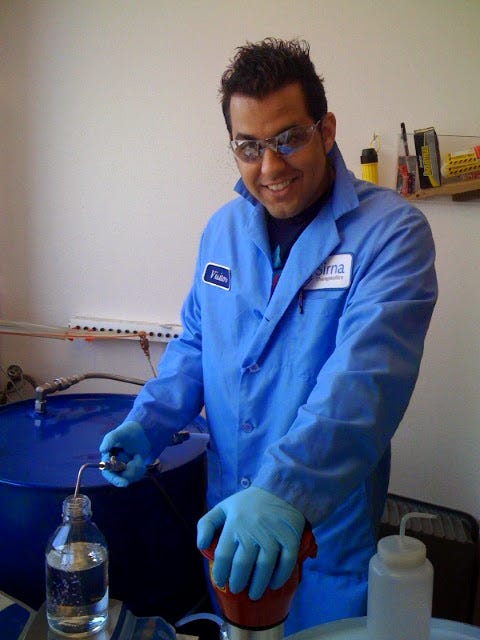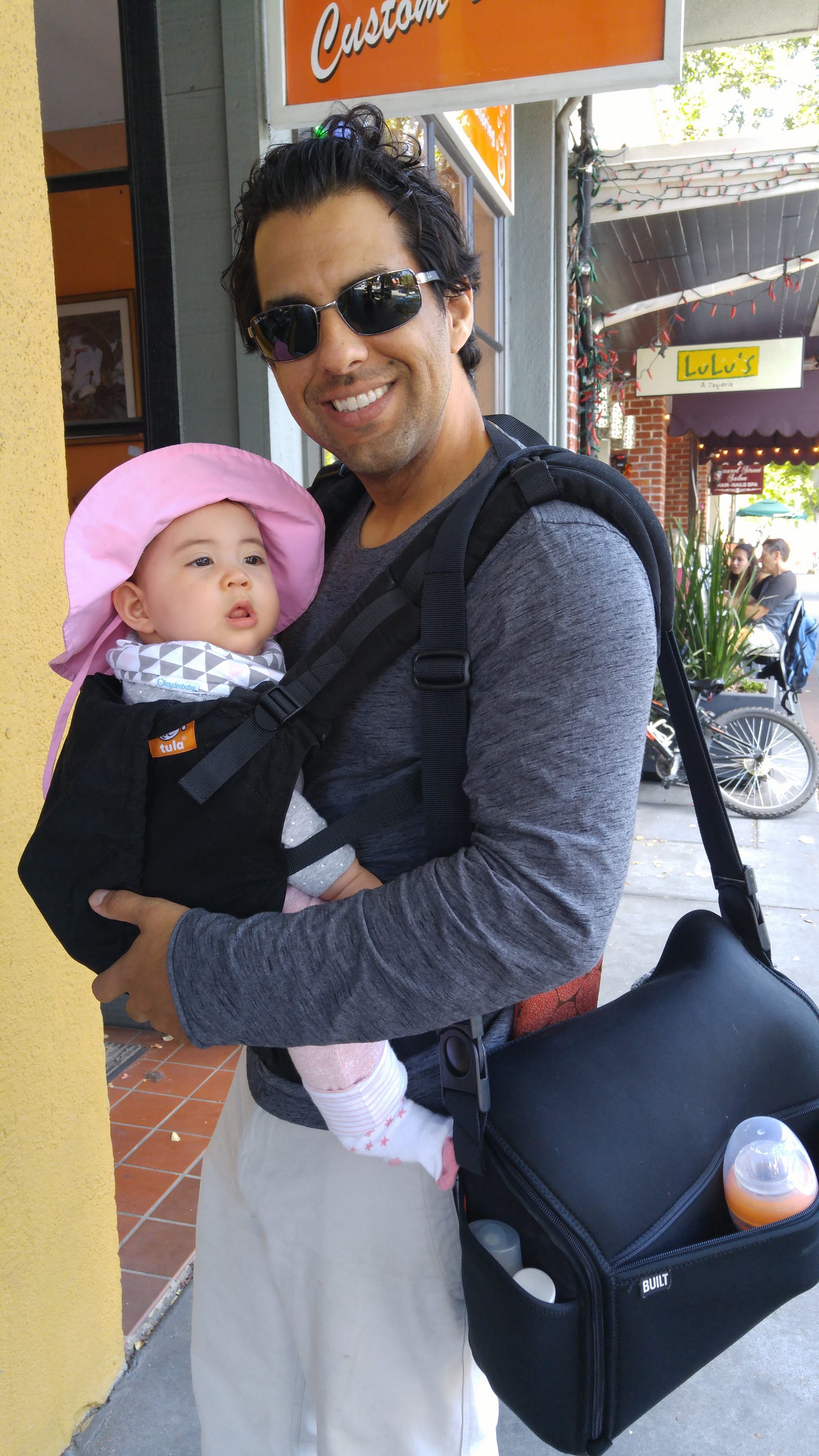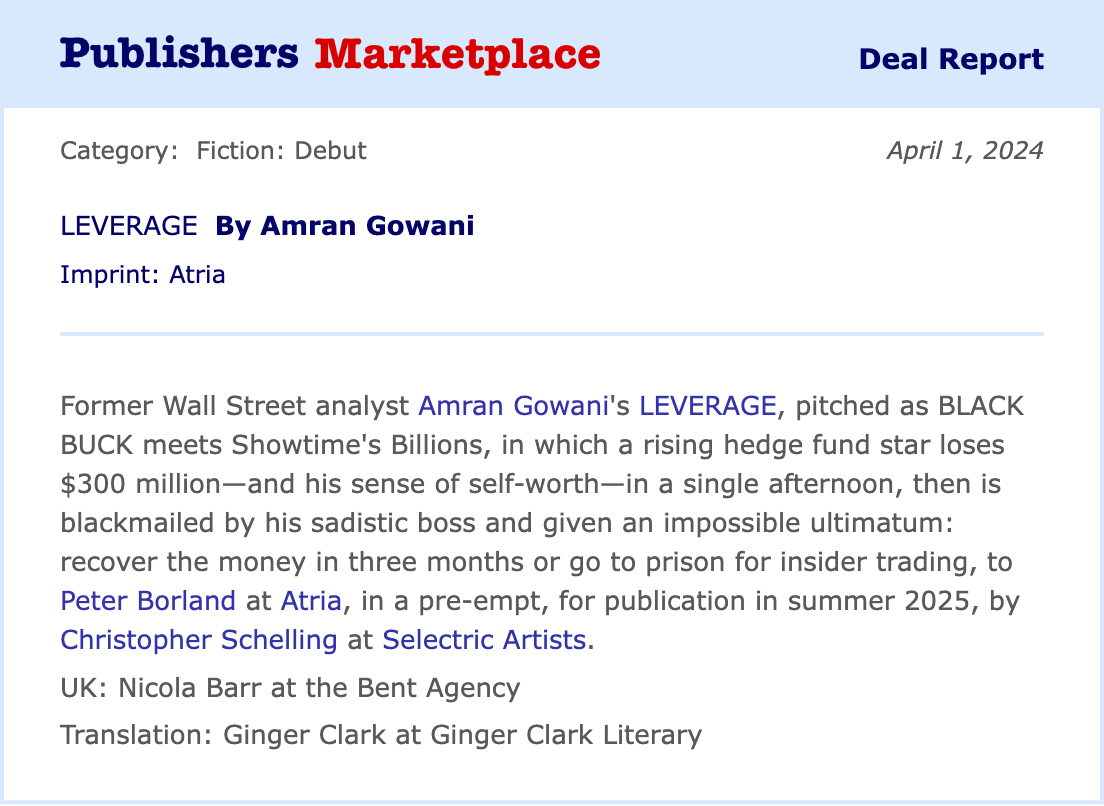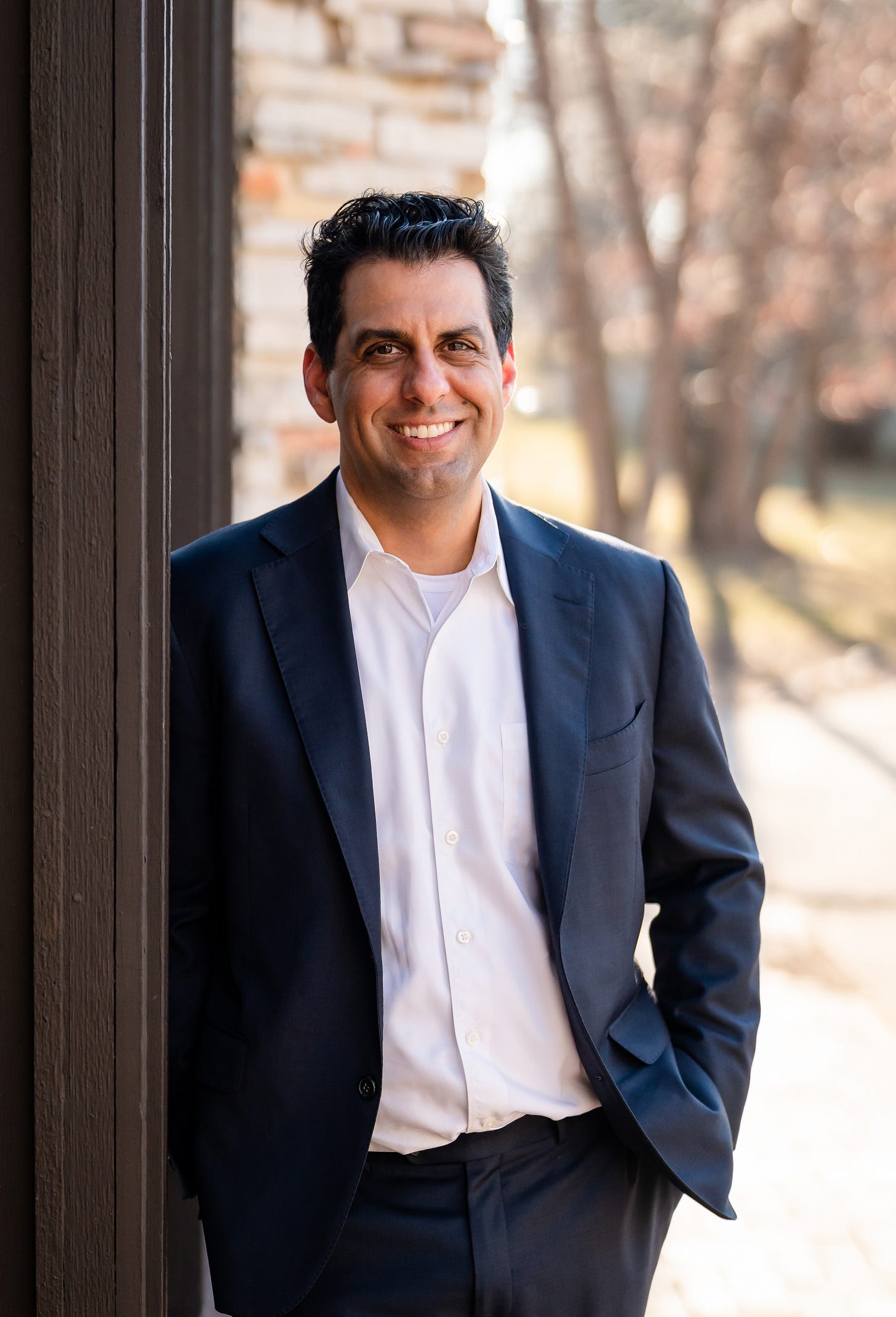"publishing is more competitive than investment banking"
how Amran Gowani went from Wall Street analyst to debut novelist
A few years ago, there was a TV show that people kept recommending to me. It was a comedy with two female leads. You’ll love it, they told me. It’s so up your alley.
I watched the first two episodes with Brian and didn’t find it funny at all.
The writers are afraid to write anything offensive, I thought. All the jokes were carefully calibrated to “punch up” and avoid hitting the wrong targets.
It’s a safe kind of comedy.
There’s nothing safe about the funniest, most profane novel I’ve read this year: Leverage by Amran Gowani. It’s a satire of the decadence and depravity of the finance industry, written by a man who worked on the inside and somehow managed to escape with his moral compass intact. If you are a fan of HBO’s Silicon Valley, or The Wolf of Wall Street, or American Psycho, you will love this one. Unlike American Psycho, Leverage has a sympathetic main character, Ali “Al” Jafar, who you are rooting for from the first chapter.
Writing is Amran’s “fifth life,” as he put it to me, and I interviewed him this week because I think his journey to publishing his debut novel as a dad of two in his forties will be relevant and inspiring to anyone reading this who is trying to figure out how to pay the bills, pursue the career of their dreams, and take care of their family.
At the end of today’s post, we’re giving away three signed copies of Leverage!
Risky pivot
Amran grew up with a “very, very modest background” living with a single mother who had him when she was eighteen. He never knew his father. When his mother got married, they all moved to Michigan, and up into the middle class. At the University of Michigan, he majored in chemistry, and then went directly from undergrad to a PhD program in North Carolina.
He did three years of the five-year program, before realizing it wasn’t for him. About leaving the program, he told me, “That was my first big career pivot, which in hindsight, it's easy to say, but at the time it was risky. Most people that get in a program, they don't feel like they can leave. And I was just like, I don't like this and I only get to live once.”
With his chemistry background, he was able to get a job working in the labs at a pharmaceutical company. His company paid $1 billion to acquire a technology startup based in Boulder, Colorado.
“And my bosses looked at me and said, well, you're a deadbeat with no wife and no kids. Why don't you go relocate for a while?”
Working in the lab in Boulder, he realized the underlying technology didn’t work. His company had completely wasted $1 billion.
That got him interested in corporate America. He decided to pursue an MBA.
Lab of villains
After his year in Boulder, he applied for MBA programs, and got rejected from all of them.
“That prepared me to become a novelist one day!” he joked.
But he kept at it, getting accepted to Carnegie Mellon, on his second round of applications in 2009. He considered focusing on brand management, but then he ended up at a recruiting event at Heinz, in a scene right out of Self Care:
“This executive is giving this market research presentation and she's talking about how this killer market research insight was that ‘moms use a lot of ketchup.’ And I thought, I can't do this. This is not a key insight into the human condition.”
To become the most well-rounded job applicant, he focused on marketing, finance, and strategy, and then went back to work again in the pharmaceutical industry.
Working for a Fortune 500 company in Philadelphia postgrad, Amran met his wife. They decided to move to San Francisco, where he got a job in investment banking in the pharmaceutical sector.
His firm was covering specialty pharmaceuticals, a sector which included “the most cynical companies, the companies actively exacerbating the opioid crisis by illegally marketing their drugs, companies just doing blatant accounting fraud…. It was just the most cynical behavior you could see in corporate America and the investors—the hedge funds, the clients—were just eating it up and we were just pumping it out. We know these companies are truly evil, but man, those stocks are on fire.”
Ethically, during this period of his life, he felt terrible. It was a fast-paced, exciting, adrenaline rush of a job, talking to CEOs of major corporations and billionaires every day. But he would go home and think about what these companies were doing and what he was doing for them, and how it did not align with his value system at all.
Insys, which he covered as a junior analyst, had a fentanyl spray that went directly under your tongue for immediate pain relief. It was intended for cancer patients. But Insys was marketing the drug for migraines and back pain, and it became overprescribed, causing many fatalities. Amran’s job as a junior analyst was to say, “it's a great investment.” He knew they were “definitely the villains here,” but due to legal compliance in his role, he was not allowed to expose the company.
His daughter had just been born, and he thought, how am I going to not be there with my kid to do this horrible job with these horrible companies? I couldn't.
And so he decided to leap to a new unknown: becoming a stay-at-home dad so that his wife could continue her career trajectory.
The timing worked out. It was early 2016, and as many of these companies began to be exposed for their fraudulent activities, the whole sector collapsed. Amran said, “You cannot do unethical practices in perpetuity. The punch bowl was taken away and then we had the hangover. And so when I stepped out of that, I said, okay, I don't want to do that ever again.”
He was a stay-at-home dad for nine months but San Francisco became too expensive; he needed a new job. He and his wife decided to look beyond the Bay Area, landing in Chicago.
“My wife's now got this long commute, but she's making great money. She's a superstar. She's supporting our family financially. My daughter is just over two. I'm making sure she gets to daycare and school and I'm doing all the housework. I’m Mr. Mom,” he told me.
When they were settled, he went to look for another job at a pharmaceutical startup, doing internal dealmaking, a full-circle moment to when he was a chemist who realized his company had overpaid for the startup in Boulder.
“I interviewed with the CFO and several top executives. Everybody loved me except the guy who was going to be my boss, who was 10 years younger than me, and didn't have anywhere near as many credentials as me. And so I didn't get the job. And it became really clear to me that he didn't want to hire me because he wanted someone that he could just boss around. And so I should be basically the CFO of this company, and instead I'm interviewing for a really junior position just because I've had this really disjointed career.”
Amran understands this is an experience that will be familiar to a lot of women: “you take time out of the workforce to take care of your family, and then they punish you for it. And so here I am with two master's degrees, all this amazing experience—humbly speaking, I'm a very competent guy. I'm not saying I'm the smartest guy, but if you ask me to do some shit, I'll do it. And then I can't even get a good job. And that's when my brain, it snapped, and I'm like, I'm writing a novel.”
The 8pm to midnight shift
He started his first novel in November 2018 and continued through the pandemic, while a stay-at-home dad to two kids. After the kids were in bed, he wrote each night from 8pm to midnight.
But the problem, he admitted, was that “the book sucked. It just wasn't good enough.” He had tried to write a satire of the pharmaceutical industry that ended up feeling more like a polemic.
In the spring of 2021, he queried twenty-five agents but “went 0 for 25.” He got one personal rejection; the rest were either form rejections or non-responses.
He knew something was missing in his writing, but he also could tell that he’d improved over the course of three years, as he worked on the book. He said, “My analogy is lifting weights. When you start lifting weights, you're not strong, but if you keep lifting, you get strong. And so I had to lift and I had to put my work in. And so the second half of my first attempt at a book is probably not bad actually, because the voice came to life and the narration came to life and the plotting came to life. And so I knew that I was hitting something right. It's just that the first third of the book was not up to snuff. And of course that's what people are going to look at [when you’re on submission].”
When he couldn’t find an agent, his wife asked him if he was going to find a job now.
Instead, Amran started writing what would become Leverage.
The plot—which he said he “pantsed”—flowed instantly. The plot structure was inspired by all the John le Carré novels he’d listened to on audio.
Halfway through the first draft, Amran thought, “let me take my business background and put it to use. Why did I not get an agent [for the first book]? What did I do wrong? I took my Wall Street analysis skills and I applied them to the publishing industry and I said, who are the main players? Who are the imprints? Who are the agents? What are the genres? What are the genre conventions? How do publishers make money? How do agents make money? These are the things I used to do in my job. Let me bring the totality of my skillset to bear here.”
A lot of writers could learn from his example! So often, I see writers blame “the market” or “late-stage capitalism” or “the fact that young people don’t read books” or “agents not reading submissions” for why they can’t sell their books. It takes a lot of humility and courage to admit you might have more to learn—in your craft as a writer, but also about the business of publishing—before you can sell your next book.
Amran started following publishing experts and launched a Substack newsletter, where he wrote weekly short form humor pieces like these scathing satires of the publishing industry:
He was building his Substack audience at the same time he was writing Leverage.
Writers often ask me if they should focus on creating content or focus on finishing their manuscripts. You can think of it seasonally (finish the manuscript first, then work on your content while the book is out with beta readers, or on submission). But the reality is that there are many writers like Amran who have figured out how to do both simultaneously—and they’re your competition. More on competition later…
His first novel was 115,000 words and written in the third-person, with a female protagonist. In Leverage, Amran wrote a shorter book (72,000 words), and from a first-person POV whose backstory was closer to his own.
“I really wanted to put a story in the world that I thought was meaningful,” he said. “And I thought, well…my background is probably more interesting than most people’s, so why not just use it?”
Through his Substack, Amran built not only an audience of readers, but a network of other writers, and by the time he finished his manuscript in July 2023, he had eight beta readers, half from Substack.
Most importantly, he earned the approval of his wife, who loves Leverage. Her full-time job gave him “the luxury of really investing and becoming a better writer and building my skills without having to hustle on a full-time job.” He calls this his biggest structural advantage.
Now you’re on the clock
After incorporating his beta readers’ feedback, he queried agents for the second time in October 2023, using Publishers Marketplace for research. This time, he had three blurbs in his query letter, from published authors he had befriended on Substack, just by “being kind of a reply guy and being social.” These blurbs, he feels, helped signify to agents that his work was something worth considering seriously. (I wrote previously about pre-endorsements here.)
First he tried agents that represent thrillers, but then realized they were looking for “dead white girls in the woods,” so he pivoted to commercial fiction agents. Out of the eight queries he sent to commercial agents, 50% requested the full.
Things happened very quickly. He queried agent Christopher Schelling on a Friday. On Monday, Schelling offered representation.
Amran described the two-week period after Schelling offered him rep as “the most fun I've ever had in publishing.” Now he could go to all the other agents and say, “Hey, now you’re on the clock.”
I think this is called… leverage!
He had a call with a literary agent at a top talent agency who told him candidly that he should go with Schelling, who would have the time to give him more support.
Amran signed with Schelling in November 2023, and by January, the novel was out on submission. In February, Peter Borland at Atria bought it in a pre-empt.
“That's the dream,” Amran said. “So it was really exciting. Everything just kind of clicked.”
I asked him whether he feels like this novel needed a male agent and editor. He told me that he didn’t find it surprising that he mainly received offers from male agents and editors. He was receiving a steady stream of rejections from female agents who wanted a “dead white girl in the woods,” and was wondering where his thriller fit into the publishing landscape.
“[There’s] all this noise about ‘men don't read fiction’ and ‘there's no market for male readers.’ And maybe that's true. Nobody knows quite for sure. My contention is that a lot of these men who say that they want a book to read, well, Leverage is the book for them.”
I told him that I’ve heard from men who feel excluded from the female-dominated publishing industry, and I’ve also heard from women who feel like they can’t get in the door either. And the fact of the matter is that it’s just an extremely competitive industry, but writers are being gaslit by writing programs that tell them “it’s not a competition.” I wish we could just acknowledge the competition!
“I know,” Amran said. “Me being the scumbag with a Wall Street background, I'm the first one to say that publishing is more competitive than investment banking. To get a book published is extremely difficult. There's this paradox where it's like, there's too many books published and it's also impossible to get your book published. I'm not sure how to reconcile that, but that's the fact.”
Amran is continuing to learn new skills as he promotes Leverage, which comes out on Tuesday. He launched a satirical TikTok account. He collaborated with Atria on a promo box for book influencers.
“When you get inside the publishing house and you have the deal, the work doesn't stop. You need to bring the same marketing prowess and professionalism and intensity level to your book at every stage of the process,” he said.
He’s still publishing his newsletter, though he left Substack last year in favor of a platform called Ghost. You can subscribe to his newsletter here. Although he lost Substack’s network effect by leaving the platform, he feels he’s cultivated a closer relationship with his readers on Ghost.
I think the biggest takeaway from Amran’s publishing experience is his lifelong student mindset: “I think it's always just about assimilating new information, learning, adapting, always changing.”
Leverage is out on Tuesday. I blurbed it:
“A profanely funny and devilishly entertaining novel about the American worship of capital at the expense of all else. Leverage has both the merry prankster vibes and the nerve-wracking pacing of r/wallstreetbets. I loved it.”
Chicagoans, catch Amran live in person August 19 at the Book Cellar with Martin Seay.
To win a free, signed copy of Leverage, comment “to the moon.” I’ll choose three winners. (Giveaway open to US residents).
How to Write a Novel
Brad Listi, host of the Otherppl podcast, one of my all-time favorite writing podcasts, has launched a new venture teaching writing through audio. How to Write a Novel is a long-form audio course featuring over 50 hours of insight and instruction from award-winning, bestselling contemporary authors including Steve Almond, Matt Bell, Emily St. John Mandel, Melissa Broder, Elizabeth Crane, Betsy Lerner, Antoine Wilson, and me, Leigh Stein—I talk about the plot structure method I used in Self Care and If You’re Seeing This, It’s Meant for You.
Check out the program website here—the enrollment fee is discounted 25% for a limited time!
How to Have Your Book Proposal Reviewed by Alia Hanna Habib
Literary agent
, one of my most popular Chat Room guests, is offering an incredible opportunity: pre-order a copy of her forthcoming book and enter to win a review of your book proposal. Alia says:The longest chapter in TAKE IT FROM ME is on book proposals, and it was my favorite chapter to write. It’s full of detailed guidance, real-life examples, candid advice from book editors, agents and publishers and no small amount of myth-busting. And there are many myths to bust: I’ve seen lots of bad proposal advice floating around out there. Click on the lil’ website Pantheon made for more details about the sweepstakes as well as praise from some of my authors vouching for my proposal skills.
Five runners up will win a query letter review.







Leigh: It's a true privilege and delight to be featured in Attention Economy!
Thank you so much for your support on this wild AF journey. And here's hoping LEVERAGE's unsafe brand of comedy unsettles as many readers as possible.
His take on the “dead white girls in the woods” market and the myth of men not reading? Spot bloody on. And calling out the gaslighting around publishing’s competitiveness? PREACH. “More competitive than investment banking”? Oof. Harsh, probably true, and exactly the kind of unvarnished truth-telling we need. No faux-inspirational fluff here – just the exhilarating, terrifying reality of making art in a brutal marketplace.
Massive congrats, Amran. Leverage sounds like the profane, nerve-shredding, capital-P Punch the system needs. Can’t wait to crack it open. And Leigh? Another ripper profile. You find the best bloody stories.